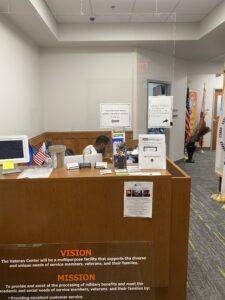
Photo courtesy: Antonio Walcott
Educational assistance in the form of financial aid subsidies and paid tuition are some of the
little-known ways that students serving in active-duty roles, on campus ROTC and students with
parents who have served can benefit from the nationwide policies created to make post-
secondary education more affordable for families.
These benefits can be found under bills such as the Post 9/11 Chapter 33 and that of the
children of deceased or disabled veterans in Chapter 35.
Students are granted access to the Chapter 33 benefits if they have served 90 consecutive days
or have been honorably discharged after a 30-day continuous period of service.
Dependents of military veterans who have reached full eligibility may also receive benefits tied
to Chapter 33 if the veteran or active service member has served after Sept. 10, 2001. Students
who qualify for aid under the Chapter 33 bill may receive their full tuition paid for at all public
and in-state universities.
Students in school more than half-time hours can have up to $1,000 in books and supplies
covered as well has being granted money for off-campus housing allocated according to the
cost of living in a recipient’s school location.
Amon McKinney, a fourth-year ROTC student at FAMU and an active service member with the
United States Air Force, uses the financial aid from the Chapter 33 bill to cover the cost of his
school and pockets any additional money he makes for personal use.
“Being able to substitute the Chapter 33 in place of taking out loans or putting myself into a
financial situation out of pocket makes focusing on school that much easier,” McKinney said.
“Knowing that that part is secure means I can focus on just keeping up with my classes and
obligations to the military.”
Like the eligibility rules related to Chapter 33, students who qualify for assistance from the child
of deceased or disabled veterans or Chapter 35 must be the child or spouse of a former service
member who has served post Sept. 10, 2001. Students can receive access to the VA education
benefits if a service member has died in the line of duty, has been declared missing in action, or
has become totally disabled by a service-connected issue.
Shameka Rawls, assistant director to FAMU’s Department of Military & Veteran Affairs, says
that most students who may have a family member in service or directly benefit from the Post
9/11 GI bills are unaware of the additional assistance they can receive and often overlook it.
“The post 9/11 bills Chapter 33 and 35 alike make it so that most if not all of a student’s tuition
is covered from the time they enroll into the university until they graduate,” Rawls said. “For
those who meet the eligibility requirements it is as simple as notifying the VA of where you’re
looking to start or are currently enrolled and forwarding that information on to us. This is
money that students can receive on top of what they already qualify for with FAFSA and
additional scholarships so it’s important that anyone who is able takes advantage of this to
avoid any unnecessary hardship.”